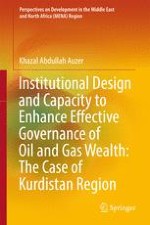This book presents a ‘critical reappraisal’ of the resource curse thesis and extends the analysis to consider political and social dimensions, and thus, the importance of structure in the petroleum sector’s governance model. It examines major challenges surrounding the governance of petroleum resources, and the implications for the economic growth and development of hydrocarbon-abundant countries as a result of ineffective economic, political, and social mechanisms. The book subsequently investigates a range of causal factors that may promote or hinder the effective management of oil and gas resources in the Kurdistan Region, which also has implications for the security of the wider region and for global energy security. The book also seeks to arrive at lessons learned and policy guidelines to help inform other new petroleum-exporting countries and regions about how to best manage their newfound wealth.
